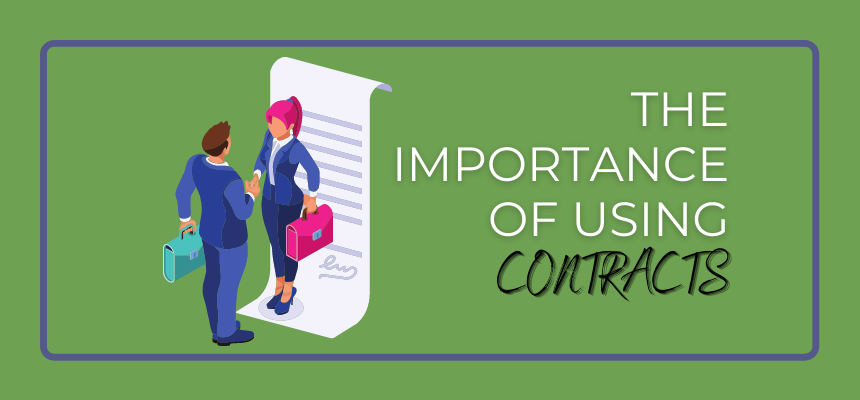Why You Should Use Contracts in Your Small Business
Safety First
A business agreement, even with a close friend or a family member, can go very wrong if legally binding safeguards are not put in place. Many people don’t bother when they know someone well because they feel it’s unnecessary or are embarrassed about it. After all, it hints that they might not fully trust the person.
I recently heard a story about a woman who needed help setting up her new business idea. A close friend offered her some assistance, and she gratefully accepted it. The pair worked hard for several weeks, concentrating on different areas of the project until it was ready for launch.
As you can imagine, it came as quite a big shock when she discovered the “helpful” friend had actually stolen the idea right out from under her. She’d even taken the complete client list and changed the passwords on every shared document they had worked on collaboratively.
When confronted, the woman was quite unremorseful and simply refused to have any further contact. Without a contract, there was really nothing the victim could do except chastise herself for her trusting nature.
You may think stories such as this are rare, but unfortunately, that isn’t the case. Many small business owners have similar tales to tell, where someone they trusted completely turned out to be an utter villain.
If you operate using only handshakes and unspoken understandings, then sooner or later, a big misunderstanding, or worse, is sure to occur.
Contracts should be drawn up for all kinds of different business relationship:
- Employees
- Freelancers
- Service providers
- Sub-Contractors
Basically, anyone, you have business dealings with, whether you know them or not.
How Contracts Protect Your Business
A contract is a written document that gives a structured outline detailing all aspects of the working relationship. They protect your business by making sure both parties fully understand what is required. This omits ambiguity and makes any agreement legally binding and enforceable.
It’s always best practice to seek professional legal advice when drawing up a contract to ensure all aspects are covered and can be actioned, if necessary, in a court of law.
A contract should:
- Ensure the parties understand their obligations
- Outline what each party is expected to do
- Give parameters regarding performance standards, delivery times, and costs
- Detail payment terms; including amounts, frequency, dates, and so on
- List all responsibilities
- Clarify any risks
- Limit liability
- Protect intellectual property
- Gard against disclosure to third parties
Make it Clear
Contracts should be written with your particular business in mind. Think carefully about how you want your business relationship to work and ensure it is laid out clearly in the agreement.
It’s common to find a lot of complex language being used in a contract. Try to avoid this and keep things simple. Complicated terms can easily be misunderstood or misinterpreted.
Remember that the goal of your contract is to clearly define all the expectations you have and protect your interests.
Conflict Prevention and Risk Mitigation
It would be unreasonable to expect the first draft of a contract to be accepted by the other party, although this often happens. Standard practice is for a degree of negotiation until both sides agree over all the details and each has the best possible deal.
If terms are agreed quickly and easily, it’s a good sign. It often indicates that the business relationship will work well and last a long time. A significant degree of conflict over the contract details can be a warning that a smooth road ahead is less likely.
Ensure you maintain copies of the agreement during all updates. Make sure that changes made are clearly marked and keep the files named accordingly. For example:
- Contract [Name of other party] V.1 [date written]
- Contract [Name of other party] V.2 [date changed]
- Contract [Name of other party] V.3 [date changed]
And so on.
Any revised documents should be kept, clearly showing who requested the changes, what they were, and when.
This audit trail helps you to go back and compare versions at a later date.
Agreement of Commitment
Once both sides agree to the draft contract, it can be finalized by each party signing and dating the agreement to show the commitment each has to the other. This can also be witnessed, with the witness adding their signature and the date to the document.
This is the beginning of a business relationship that will hopefully last a long time and benefit both sides.
It is regrettable, but things don’t always work out. Sometimes, agreements will be broken, and this is when the contract comes into its own. It works as proof of what each party promised they would do, and if they fail to meet with their commitments, they become liable for them as per the terms in the contract. Be aware that this can work both ways!
Limitation of Risk
Placing an important part of your business into someone else’s hands can seem daunting, and it takes time to build lines of contact, collaboration, and trust.
Having an agreement in place limits the amount of risk involved, and if things don’t work out the way you want, there will be an exit strategy clearly outlined within the terms of the contract.
This works for both parties, as if either is not happy with the way things are going, they can choose to terminate their association according to the contract.
It isn’t in the interests of either party for the relationship to fail. One needs a job doing, and the other is offering to do that job in exchange for payment. If the party carrying out the work doesn’t complete it to the agreed standard, then it is possible to withhold payment until this is addressed, providing it was stipulated in the contract.
Creating a Contract
Creating a contract can seem like an arduous task, but by making a template, it is often possible to use the same standard agreement for multiple people.
You will undoubtedly need to make a fair number of changes, but you will at least have the basis from which to work, saving you time and effort.
Don’t forget to run any contracts by a qualified legal advisor to check they are watertight. Most will do this for a small charge, and once you know the agreement you’ve created is good, you can use it multiple times with only minor changes for names, dates, and so on.
Conclusion
No matter who you are engaging with, a new staff member, a freelancer, or another company, you should have a contract in place to protect your business.
More often than not, those you hire will want to provide a good and honest job. However, you cannot separate them from those who will purposely try to defraud you or simply make an honest mistake.
The information given here is for general information purposes and is not intended to provide legal or business advice. For this, you should contact your legal representative.
Akaunting is focused on helping you make running your business as easy as possible. The new Contracts app was designed to make contract management a breeze, and it’s super easy to use.
The app helps you to stay organized, access contracts instantly wherever you are, keep all your contract billing details in one place, and maintain transparency with your contract financials. Why not take a look?





Comments